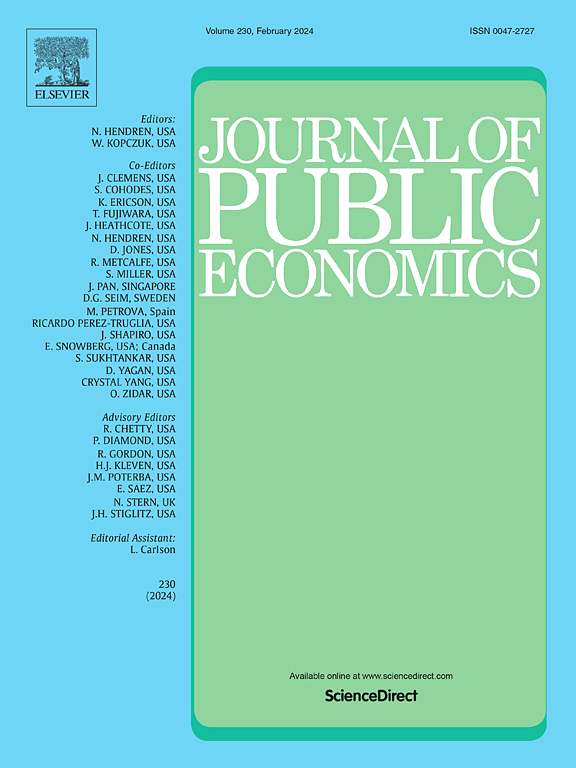我应该留在(学校)还是应该去(工作)
IF 4.8
1区 经济学
Q1 ECONOMICS
引用次数: 0
摘要
我在一个具有随机人力资本积累和不完全市场、内生劳动力供给以及以实物期权为模型的教育选择的模型中,探讨了最优教育补贴和劳动税累进性的问题。在纯分析的基线模型中,学生有严格的借贷限制,这导致了没有储蓄的非贸易均衡,政府通过向学生转移支付教育经费,或者--等同于--通过向大学提供助学金来支付教育经费。社会福利最大化政策的特点是慷慨的教育补贴和高度累进的劳动税,这比目前在美国或欧洲所看到的要高得多,并导致平均 8%的消费等值收益。这一结果在无数扩展模型中都是稳健的,包括一个具有宽松金融摩擦的定量模型,在该模型中,学生可以借贷来资助他们的教育,因此均衡模型中的工人具有广泛的预防性储蓄。本文章由计算机程序翻译,如有差异,请以英文原文为准。
Should I Stay (in School) or Should I Go (to Work)
I explore optimal education subsidies and progressivity of labour taxes in a model with stochastic human capital accumulation and incomplete markets, endogenous labour supply and an education choice modelled as a real option, where agents choose an optimal number of years to study before starting work. In a purely analytical Baseline model with tight borrowing constraints on students, which leads to a no-trade equilibrium without savings, the government pays for education via transfers to students or – equivalently – via grants to universities. The social welfare-maximising policy features generous education subsidies and highly progressive labour taxes, much more so than currently seen in the US or Europe, and results in an average consumption-equivalent gain of 8%. This result is robust to myriad extensions, including a Quantitative model with relaxed financial frictions where students can borrow to finance their education, and where hence the equilibrium features extensive precautionary saving by workers.
求助全文
通过发布文献求助,成功后即可免费获取论文全文。
去求助
来源期刊

Journal of Public Economics
ECONOMICS-
CiteScore
14.10
自引率
2.00%
发文量
139
审稿时长
70 days
期刊介绍:
The Journal of Public Economics aims to promote original scientific research in the field of public economics, focusing on the utilization of contemporary economic theory and quantitative analysis methodologies. It serves as a platform for the international scholarly community to engage in discussions on public policy matters.
 求助内容:
求助内容: 应助结果提醒方式:
应助结果提醒方式:


